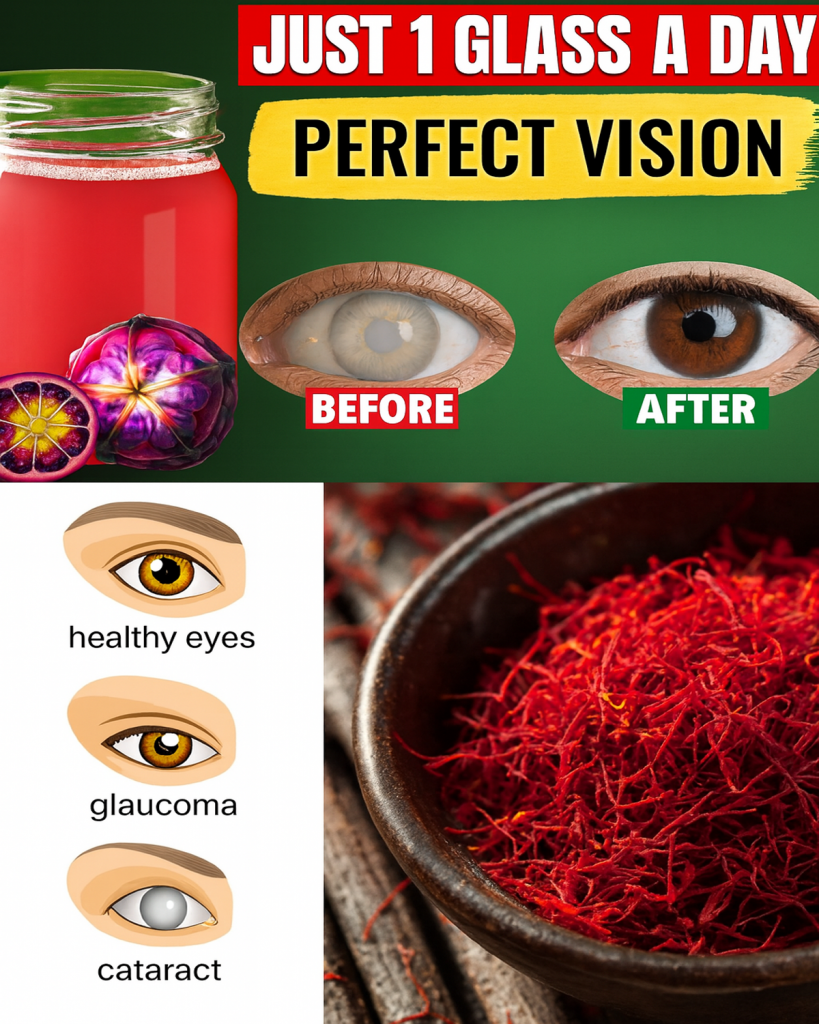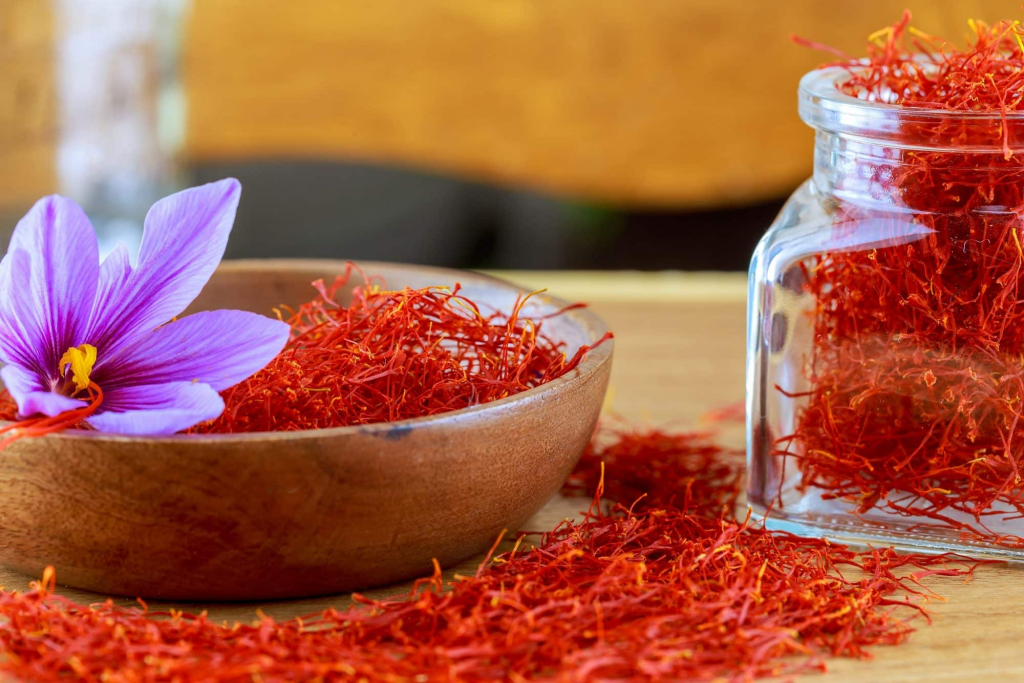Vision problems are becoming increasingly common in today’s digital age. With more than 2.2 billion people worldwide affected by some form of vision impairment, eye health is no longer a concern limited to aging adults—it’s now a global issue. The rise of smartphones, computers, and long hours of screen exposure has accelerated the demand for natural solutions to support and protect eyesight.
Among the many natural remedies studied, saffron stands out as one of the most promising. Known as the “golden spice,” saffron has been treasured for centuries in traditional medicine for its healing and rejuvenating properties. Recent scientific research now suggests that saffron may also support vision, particularly by protecting the retina and slowing age-related eye conditions.
In this article, you’ll discover how saffron works for eye health, the science behind its benefits, practical ways to use it daily, and inspiring examples of how it can be incorporated into your lifestyle. If you’re searching for a natural way to protect your eyes and improve vision, saffron might be the single ingredient you’ve been overlooking.

Why Eye Health Matters More Than Ever
Eyes are among the most sensitive organs in the body, and their health can be affected by both lifestyle and environment. Common problems include:
- Digital eye strain: From prolonged screen use
- Age-related macular degeneration (AMD): Leading cause of blindness in older adults
- Dry eyes and irritation: From lack of proper hydration and nutrient deficiencies
- Poor night vision: Often caused by oxidative stress or low vitamin intake
Traditional approaches rely heavily on supplements, glasses, or surgery. But the rising interest in natural remedies like saffron highlights how powerful diet and lifestyle can be in preserving vision.
The Science Behind Saffron and Vision
Saffron is derived from the flower Crocus sativus, and its health benefits come mainly from two compounds: crocin and safranal. These compounds act as antioxidants, protecting eye cells from oxidative stress and supporting the delicate structures of the retina.

Key Research Findings:
- A clinical trial published in Evidence-Based Complementary and Alternative Medicine showed that saffron supplementation improved retinal function in patients with early age-related macular degeneration.
- Another study found that saffron helped enhance light sensitivity and visual acuity in adults with mild vision impairment.
- Antioxidant compounds in saffron may help slow down photoreceptor damage, supporting long-term eye health.
| Compound | Function for Eyes |
|---|---|
| Crocin | Protects retinal cells, improves blood flow |
| Safranal | Antioxidant, reduces oxidative stress |
| Carotenoids | Support macular health and night vision |

Benefits of Saffron for Eye Health
1. Protects Against Age-Related Macular Degeneration (AMD)
AMD is one of the most common causes of vision loss in older adults. Saffron’s antioxidants may help slow its progression by protecting retinal cells and improving blood flow in the eyes.
2. Improves Night Vision
People who supplemented with saffron reported better vision in low light, making it useful for those who struggle with driving at night or working in dim environments.
3. Reduces Digital Eye Strain
With more screen exposure than ever, saffron’s anti-inflammatory properties may ease strain, dryness, and irritation caused by blue light and prolonged device use.
4. Enhances Retinal Function
By improving oxygen supply and blood circulation in the eyes, saffron supports sharper vision and reduces fatigue.

How to Use Saffron for Vision Support
Saffron can be incorporated into your daily life in simple and delicious ways.
1. Saffron Tea
- Add 3–4 saffron threads to a cup of boiling water.
- Steep for 10 minutes.
- Add honey for taste.
2. Saffron Milk
- Warm a cup of milk.
- Add 2–3 threads of saffron.
- Drink before bedtime to promote relaxation and eye health.
3. Cooking with Saffron
- Use saffron threads in rice, soups, or stews for added flavor and nutrition.
4. Supplements
- Standardized saffron capsules are available. Always consult a healthcare professional for the correct dosage.

Practical Lifestyle Tips Alongside Saffron
While saffron can play a powerful role, it works best when combined with overall healthy habits:
- Limit screen time or follow the 20-20-20 rule (every 20 minutes, look at something 20 feet away for 20 seconds).
- Stay hydrated to reduce dry eye symptoms.
- Eat a balanced diet rich in leafy greens, omega-3 fatty acids, and colorful vegetables.
- Wear sunglasses outdoors to protect against UV damage.
Case example: In Mediterranean regions where saffron is regularly consumed, studies show lower rates of age-related vision problems, highlighting the impact of dietary patterns on eye health.
Safety and Precautions
Saffron is generally safe when consumed in moderate amounts. However:
- High doses may cause dizziness or nausea.
- Pregnant women should consult a doctor before use.
- Supplements should always be purchased from trusted sources to avoid adulteration.
Conclusion
Saffron is more than just a culinary luxury—it’s a natural ally for eye health. With its antioxidant compounds crocin and safranal, it supports retinal function, reduces oxidative stress, and may even slow the progression of age-related macular degeneration. Whether enjoyed in tea, milk, or cooking, saffron offers a simple and effective way to nourish your vision naturally.
Frequently Asked Questions
Can saffron really improve vision?
Research suggests it may help support retinal function and improve visual acuity, especially in early stages of AMD.
How much saffron should I consume daily?
A few threads in tea or milk are generally enough. For supplements, follow medical guidance.
Is saffron safe for long-term use?
Yes, in culinary amounts. Always consult a doctor if taking concentrated supplements.
This article is for informational purposes only and should not replace professional medical advice. Always consult a healthcare provider before starting new remedies or supplements for vision support.




